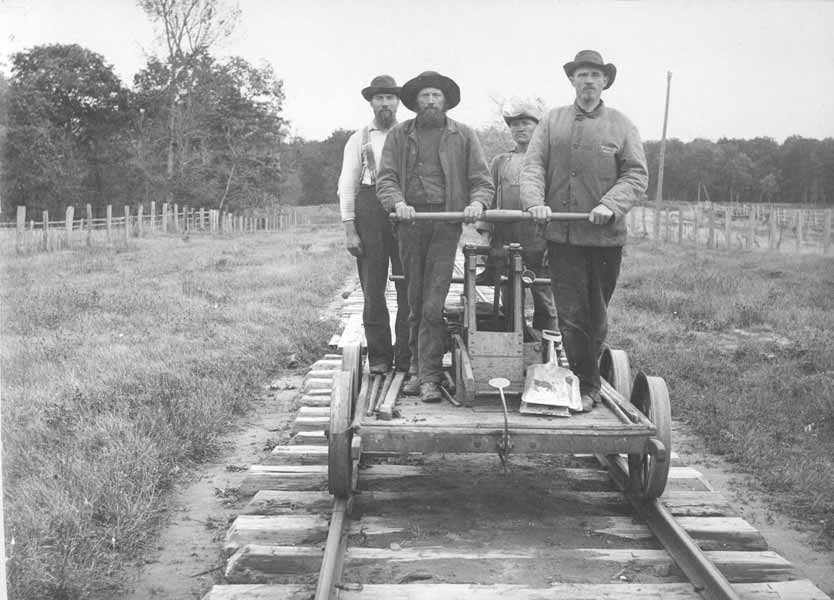
There are lots of songs about dangerous professions, like cowboying or lumbering, but the railroad has surely inspired more songs than any other American industry or activity. Katy Letcher Lyle devoted a whole book to train wreck songs (Scalded to Death by the Steam, Algonquin, 1991). The general public bought lots of records of these songs, so there were many lawsuits disputing the authorship of, say, the Wreck of the Old 97. The natural rhythm of the steam locomotive invited all sorts of train imitation pieces for harmonica, fiddle or guitar. Even the most discordant heavy metal band can't imitate a jet aircraft at takeoff, so I don't expect that genre will be modernized. All types of railroad songs are the subject of a fascinating book by Norm Cohen, Long Steel Rail: The Railroad in American Folksong (U. of Illinois Press, 1981, 2000). One big category is about the workers who built and maintained the roadbeds. Some are work songs, such as Ho Boys, Can't You Line 'Em; some celebrate the hard work involved; others glorify the profession. This month's song is one of the latter, although it was not composed by a railroad worker.
The original Carter Family, A.P. Carter, his wife Sara, and her cousin Maybelle Carter, sold myriads of records in the 1920s and 30s, enough to found a musical dynasty that's now in its fourth generation. One line of modern country music grew out of their sound. They used their inherited traditional material initially, but as they needed more, they scoured the mountains for other songs. Finally, they had to write their own songs to meet record contracts. Sara and A.P. divorced, but they still had record contracts to fulfill. She married A.P.'s cousin Coy Bayes and moved to California, but still had to return east to record. According to Long Steel Rail, she read somewhere about a drifter who worked on the railroad in Wyoming. While traveling East, they went through that state. She remembered the story, and jotted down these verses. Later, she composed an excellent traditional-style tune for it. In the 1950s, she, A.P., and their children recorded for Acme Records, before Roadrunner cartoons gave "Acme" a bad name. Sara included this song, for which we will be forever grateful. I have made one change in the song. When driving through Laramie, she misread the road sign as "Lamar," and that's how she sang it on the recording. There is no Lamar, Wyoming, even far from the great divide.
I thought about this song when I found an old photo. My paternal
grandfather and two of his brothers worked on the spur line between
Taylor's Falls and Wyoming, Minnesota. At some time in the decade
before 1884, they hired a professional photographer, took him out on
the line, and proudly had their portrait taken on a handcar, a momento
to their profession as section hands. They might not have been as tough
as John Henry drilling through the Big Bend tunnel, but building and
maintaining track even on level ground was hard, dangerous work. I look
at the photograph (my grandfather is on the right, in front), and it
seems totally foreign to an era that does not
respect physical labor, no matter how noble.

Complete Lyrics:
1. Nineteen and sixteen I started to roam,
Out in the West, no money, no home;
I went drifting along with the tide,
I landed on the Great Divide.
 CHORUS:
CHORUS:
Railroading on the Great Divide,
Nothing around me but Rockies and sky;
There you'll find me as years go by,
Railroading on the Great Divide.
2. Ask any old-timer from old Cheyenne,
Railroad in Wyoming, the best in the land;
The long steel rails, the short cross-ties,
I laid across the Great Divide.
CHO.
3. As I looked out across the trees,
Number Three coming, the fastest on wheels;
Through old Laramie she glides with pride,
And rolls across the Great Divide.
CHO.